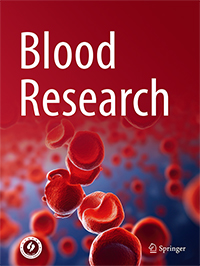Original Article
 Split Viewer
Split Viewer
Blood Res 2016; 51(2):
Published online June 23, 2016
https://doi.org/10.5045/br.2016.51.2.102
© The Korean Society of Hematology
Risk factors for mortality in patients with bloodstream infections during the pre-engraftment period after hematopoietic stem cell transplantation
1Department of Infectious Diseases, Belarusian State Medical University, Minsk, Belarus.
2Department of Infectious Diseases, City Clinical Hospital №9, Minsk, Belarus.
Correspondence to : Correspondence to Igor Stoma, M.D. Department of Infectious Diseases, Belarusian State Medical University, Prititskogo str., 2-2-105, 220073, Minsk, Belarus. igor.stoma@gmail.com
This is an Open Access article distributed under the terms of the Creative Commons Attribution Non-Commercial License (http://creativecommons.org/licenses/by-nc/4.0) which permits unrestricted non-commercial use, distribution, and reproduction in any medium, provided the original work is properly cited.
Background
Bloodstream infections (BSI) remain a frequent complication during the pre-engraftment period after hematopoietic stem cell transplantation (HSCT), resulting in high mortality rates. This study evaluated risk factors for mortality in hematopoietic stem cell transplant recipients with BSI in the pre-engraftment period.
Methods
This prospective case control study was performed at the Center of Hematology and Bone Marrow Transplantation in Minsk, Republic of Belarus. Data relating to patient age and gender, date and type of transplantation, conditioning chemotherapy regimen, microorganisms isolated from blood, and antibacterial therapy were prospectively collected from all hematopoietic stem cell recipients with microbiologically proven cases of BSI in the pre-engraftment period. The primary outcome was all-cause 30-day mortality after onset of febrile neutropenia.
Results
A total of 135 adult patients with microbiologically proven BSI after HSCT were studied, with 65.2% of cases caused by gram-negative microorganisms and 21.5% by non-fermenting bacteria. Inadequate empiric antibacterial therapy and isolation of carbapenem-resistant non-fermenting gram-negative bacteria (
Conclusion
The risk factors for mortality in adult patients with BSI in the pre-engraftment period after HSCT were inadequacy of empirical antibacterial therapy and isolation of carbapenem-resistant
Keywords Hematopoietic stem cell transplantation, Bloodstream infection, Risk factors, Antibacterial therapy
Article
Original Article
Blood Res 2016; 51(2): 102-106
Published online June 23, 2016 https://doi.org/10.5045/br.2016.51.2.102
Copyright © The Korean Society of Hematology.
Risk factors for mortality in patients with bloodstream infections during the pre-engraftment period after hematopoietic stem cell transplantation
Igor Stoma1*, Igor Karpov1, Natalia Milanovich2, Anatoly Uss2, and Igor Iskrov2
1Department of Infectious Diseases, Belarusian State Medical University, Minsk, Belarus.
2Department of Infectious Diseases, City Clinical Hospital №9, Minsk, Belarus.
Correspondence to: Correspondence to Igor Stoma, M.D. Department of Infectious Diseases, Belarusian State Medical University, Prititskogo str., 2-2-105, 220073, Minsk, Belarus. igor.stoma@gmail.com
This is an Open Access article distributed under the terms of the Creative Commons Attribution Non-Commercial License (http://creativecommons.org/licenses/by-nc/4.0) which permits unrestricted non-commercial use, distribution, and reproduction in any medium, provided the original work is properly cited.
Abstract
Background
Bloodstream infections (BSI) remain a frequent complication during the pre-engraftment period after hematopoietic stem cell transplantation (HSCT), resulting in high mortality rates. This study evaluated risk factors for mortality in hematopoietic stem cell transplant recipients with BSI in the pre-engraftment period.
Methods
This prospective case control study was performed at the Center of Hematology and Bone Marrow Transplantation in Minsk, Republic of Belarus. Data relating to patient age and gender, date and type of transplantation, conditioning chemotherapy regimen, microorganisms isolated from blood, and antibacterial therapy were prospectively collected from all hematopoietic stem cell recipients with microbiologically proven cases of BSI in the pre-engraftment period. The primary outcome was all-cause 30-day mortality after onset of febrile neutropenia.
Results
A total of 135 adult patients with microbiologically proven BSI after HSCT were studied, with 65.2% of cases caused by gram-negative microorganisms and 21.5% by non-fermenting bacteria. Inadequate empiric antibacterial therapy and isolation of carbapenem-resistant non-fermenting gram-negative bacteria (
Conclusion
The risk factors for mortality in adult patients with BSI in the pre-engraftment period after HSCT were inadequacy of empirical antibacterial therapy and isolation of carbapenem-resistant
Keywords: Hematopoietic stem cell transplantation, Bloodstream infection, Risk factors, Antibacterial therapy
-
Demographic and clinical baseline characteristics of patients with BSI in the pre-engraftment period after HSCT (N=135).
-
Risk factors for mortality in adult patients with BSI in pre-engraftment period after HSCT in univariate analysis. a)
Escherichia coli orKlebsiella pneumoniae , showing the resistance phenotype of extended spectrum beta-lactamase producer (ESBL); b)Methicillin-resistantStaphylococcus aureus ..
-
Results of multivariate analysis of risk factors for 30-day mortality in patients with BSI in the pre-engraftment period after HSCT.
-
Causes of BSI in the pre-engraftment period after HSCT.

Article Tools
Stats or Metrics
Related articles in BR
-
Risk Factors of Bloodstream Infection Associated Mortality in Pediatric Patients with Hemato-oncologic Disease
Hye Won Park, Hoi Soo Youn, Ho Joon Im, Mi, Na Kim, Jong Jin Seo, Hyung Nam Moon
Korean J Hematol 2007; 42(4): 343-352 -
Transfusion support in hematopoietic stem cell transplantation
Dong Wook Jekarl, Jae Kwon Kim, Jay Ho Han, Howon Lee, Jaeeun Yoo, Jihyang Lim, Yonggoo Kim
Blood Res 2023; 58(S1): S1-S7 -
Prognostic impact of total body irradiation dose in pediatric acute lymphoblastic leukemia patients treated with allogeneic hematopoietic stem cell transplantation in second complete remission
Wonjin Jang, Suejung Jo, Jae Won Yoo, Seongkoo Kim, Jae Wook Lee, Pil-Sang Jang, Nack-Gyun Chung, Bin Cho
Blood Res 2022; 57(4): 256-263




 PDF
PDF Standard view
Standard view Export citation
Export citation Share
Share  Previous Article
Previous Article



